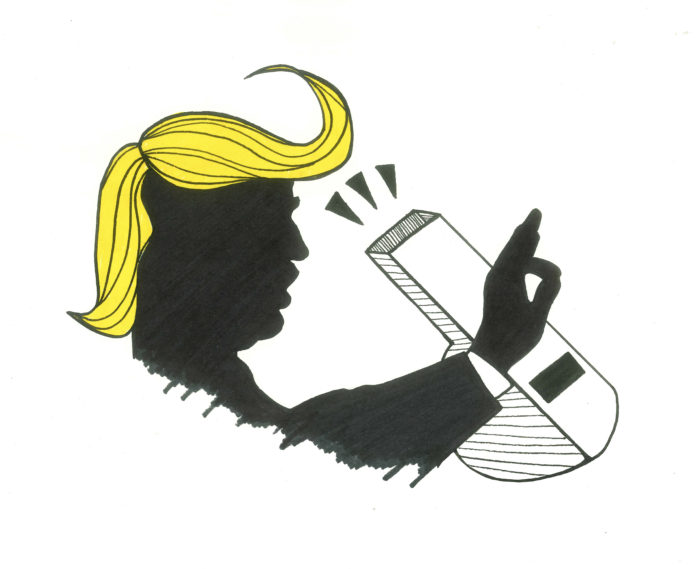A few weeks ago, my friend told me about her obsession with The Bachelor. She explained that even though she knows it’s bad, she loves it. I, the pompous intellectual that I am, informed her that the show is trashy, overproduced and ultimately meaningless.
I was too ashamed to admit this at the time, but I have a guilty pleasure too. I watch it at night and spend all day thinking about what is going to happen next. It’s scandalous. It’s intriguing. Some of the contestants might be “in it for the wrong reasons,” but that adds drama. And yeah, I cringe a little while watching. Okay, I do more than cringe. Sometimes I fear for the future of humanity. Sometimes I contemplate everything that has happened to bring us to this point in history. But still, I keep tuning in.
President Donald Trump has turned the 2020 presidential election into the trashiest reality game show on television. He loves it because it allows him to dominate attention and construct his own version of reality. Too many people, including Democrats, are intrigued by Trump’s tactics and engage in politics in a harmful, superficial way.
As he did on The Apprentice, Trump acts like a villainous reality TV show character, branding his political opponents with lasting unflattering personas. In 2016, Trump’s repetition of the nickname “Crooked Hillary” advanced an image of Hillary Clinton as a corrupt career politician — a characterization that may have ultimately helped him win the election. Now he is using the same strategy for 2020. Early in the campaign, he nicknamed former Vice President Joe Biden “Sleepy Creepy Joe.” He also continues to refer to Sen. Bernie Sanders as “Crazy Bernie” and mock Sen. Elizabeth Warren’s claims to Native American heritage by calling her “Pocahontas.”
Although these nicknames may simply be viewed as childish insults, Trump’s characterization of Democratic candidates drives the political discourse. Some Democrats claim Sander’s ideas are too radical or Biden lacks energy and enthusiasm.
Democrats are affected by Trump’s inflammatory language and destructive discourse. Many criticize and praise candidates based on superficial qualities such as the way they speak. As a result, the Democratic debates resemble game shows. Candidates fight for speaking time and sound bites, hoping to be the one people are talking about the next day. After the debates, people tend to be talking about the most dramatic moments, especially moments when one candidate attacked another. For example, one of the main topics of conversation after the third debate was Julián Castro’s attack on Biden’s memory, which many viewed as ageist. There is rarely a conversation about a particular candidate’s policy.
Trump benefits when people focus on personality over policy. Since his 2016 campaign, he has craved the spotlight and altered reality to fit the narrative he wants. He lied about the size of his inaugural audience. He has called foreign leaders immature nicknames and made jokes about nuclear war. He diverted $2.5 million from the National Park Service to pay for his Fourth of July military extravaganza. And now, he is playing off his collusion with Ukraine as “a Democrat Scam.”
His supporters are drawn in by the role he plays as a reality show villain. He lies and cheats, and his fans respect him for it. That’s how he got elected with nothing but slogans and empty promises. It’s also why he managed to get caught pressuring Ukraine to investigate one of his biggest political rivals without taking a hit to his approval ratings. The Ukraine scandal is a clear example of Trump cheating and undermining the election system. But to Trump’s supporters, he is just playing his game to win.
The reality show drama of this election intrigues people. Voter turnout in 2020 could be record-breaking, and college students’ participation is expected to increase from 43.8 percent in 2016 to 80 percent.
While it may seem like an increase in political interest is a good thing, there is a difference between people treating politics like a TV show and engaging to make meaningful change. Trump has gained support from a unique demographic using divisive tactics including mocking his opponents and portraying himself as a hero. Democrats are enraged by his behavior, but they will not be able to make changes if they ignore political issues and engage in shallow conversation.
Misguided political passion is destructive, but an increase in voter participation will be beneficial if we limit harmful discourse and make informed decisions. It’s important to be careful of what criticism we make of other candidates and to be mindful of where the criticism we hear comes from. It’s okay to criticize a candidate’s policy, but criticisms based on appearance and personality are unproductive and perpetuate Trump’s ideology. We can’t just vote for the candidate we like best. We have to think about who will be best for our country. Decisions based on personality and inflammatory language gave us Trump, and we can’t let it happen again.
Jenna Fabris is an undeclared first year. She can be reached at jfabris@oxy.edu
![]()




































